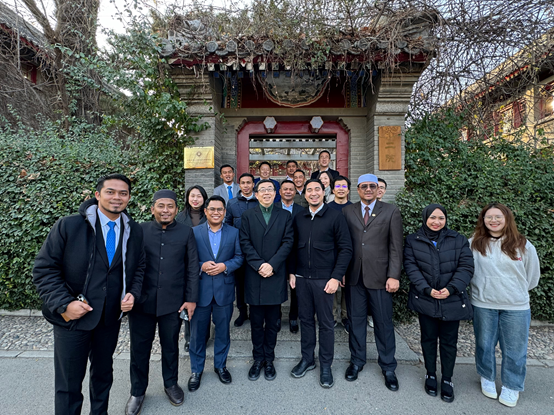
The 37th session of the Adventus Amicorum Seminar Series, organized by Peking University’s Institute of Area Studies, was held on November 20, 2024. The seminar featured an exchange between members of Malaysia’s Perikatan Nasional (PN) delegation and scholars from Peking University. The PN delegation included Wan Ahmad Fayhsal, Chief of Foreign Affairs for the PN Supervisory Committee and Supreme Council Member of the Malaysian United Indigenous Party (BERSATU); Roslan Bin Hashim, Member of Parliament for Kedah; Ahmad Fadhli Bin Shaari, Head of Publicity for the Malaysian Islamic Party (PAS) and Kelantan State Assemblyman; and Muhd Khidhir Bin Izaidin, Secretary of the PAS Youth Wing and Foreign Affairs Department. The seminar was chaired by deputy director of the Institute of Area Studies, Professor Zhai Kun. Other participants included Kong Tao, Director of the Research Division at the Chinese Social Sciences Survey Center of Peking University; Xie Kankan, Assistant Professor at the School of Foreign Languages; Kong Jinlei, Lecturer at the School of Asian Studies at Beijing Foreign Studies University; and doctoral students from the Institute of Area Studies.
Zhai Kun opened the seminar with a warm welcome to the PN delegation, highlighting the unique opportunity for scholars and political leaders from both countries to engage in meaningful dialogue.
In the discussion session, Xie Kankan introduced the development of Malay language education programs in Chinese universities and the progress of Southeast Asian studies in China. He shared his personal journey from being a student of the Malay language to becoming a Southeast Asian studies scholar. Prof. Xie expressed optimism about the prospects for collaboration between China and Malaysia in Malay language education and regional studies. He also engaged in an in-depth discussion with Ahmad Fadhli about the implementation and future direction of China’s language training programs.
In response to a question from Wan Ahmad Fayhsal on how China views the future of China–Malaysia relations as Malaysia assumes the ASEAN Chairmanship in 2025, Prof. Zhai highlighted Malaysia’s unique role as a “connective power” bridging Southeast Asia and the Islamic world. He elaborated that the concept of “connective power” better captures Malaysia’s distinctive attributes than the traditional label of a “middle power,” reflecting its outsized international influence and commitment to an independent foreign policy tradition. His insights were met with broad approval from the PN delegation.
Kong Jinlei, Kong Tao, and doctoral student Su Lin joined the dialogue, sharing perspectives from their research areas on topics such as Malaysia’s patronage system, Islamic economics, and pressing international issues. Both sides exchanged views from multiple angles, exploring opportunities for deeper cooperation. Wan Ahmad Fayhsal reiterated Malaysia’s commitment to an independent foreign policy and expressed hope for greater collaboration with China within a multilateral framework. The delegation members also extended a warm invitation to Peking University students to visit their constituencies for field studies and cultural experiences.
The seminar concluded with a consensus among the participants that enhancing China-Malaysian relations requires expanding beyond official interactions to include cultural and commercial exchanges. Through multi-sector and multi-layered engagement, the two nations can achieve mutual enrichment and foster shared success. Both the PN delegation and the Peking University scholars expressed their enthusiasm for continuing dialogue and exploring future collaborations in academic and practical fields.


